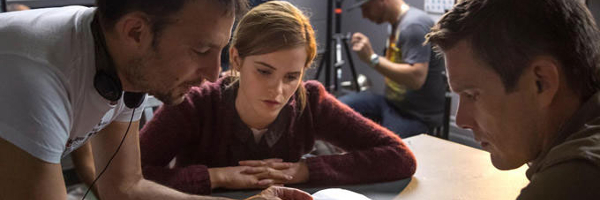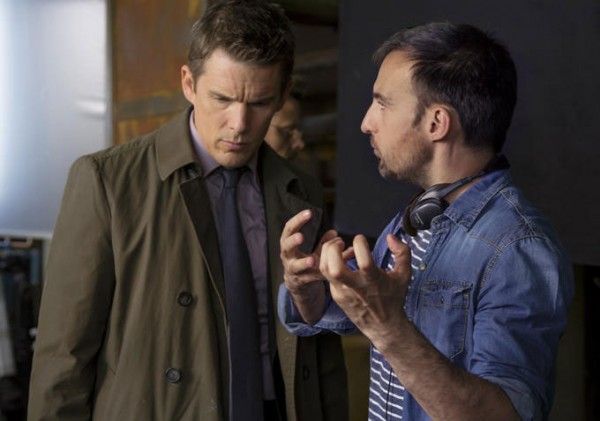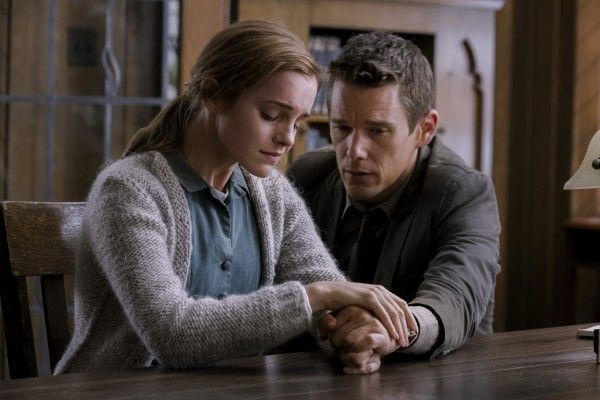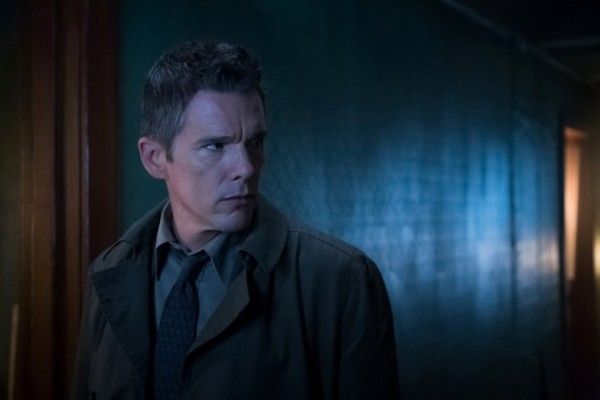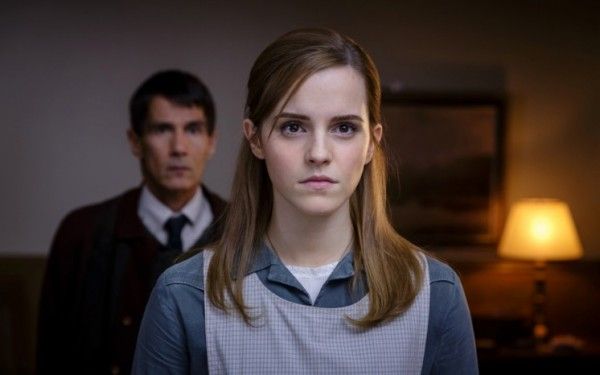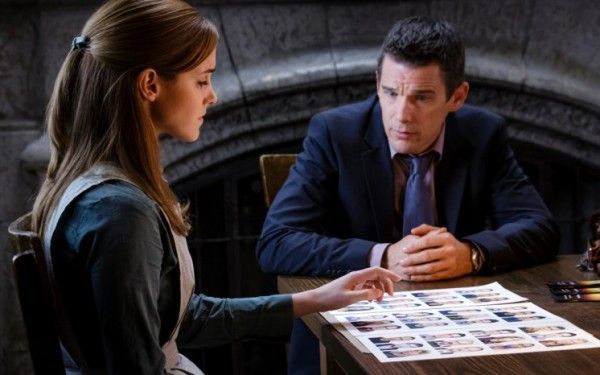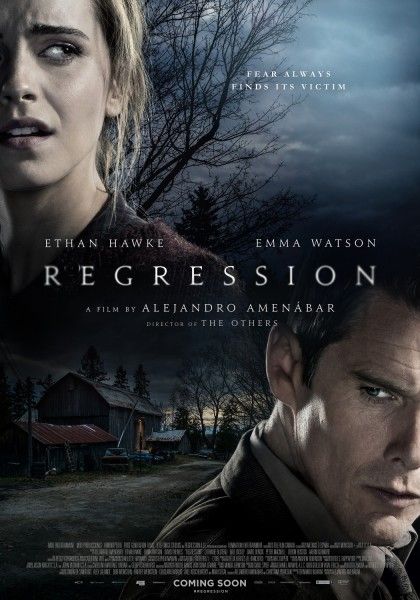With Regression now in theaters, I recently spoke by phone with filmmaker Alejandro Amenabar, who wrote and directed the ominous supernatural thriller starring Ethan Hawke. Hawke portrays a Minnesota detective determined to uncover the truth behind the allegations of a young woman (Emma Watson) who insists her father (David Dencik) sexually abused her. When the father is unable to recall what happened, Hawke’s character seeks help from a regression therapy expert (David Thewlis) to find out.
In our interview, Amenábar talked about what inspired him to make a procedural thriller focusing on themes of regression therapy and satanic rituals, his decision to set the story in the early 1990’s, why he shot Toronto for Minnesota, his cast and why he felt they were the right actors to bring the characters to life, how he was open to their suggestions and enjoyed the interaction between directing and acting, the most challenging aspects of the production, his creative collaboration with DP Daniel Aranyó and composer Roque Baños and how they helped him execute his vision, and what he’s working on next. Check it all out in the interview below.
How did this project first come together for you?
ALEJANDRO AMENABAR: It was a few years ago. I wanted to make a movie about the devil and wanted to go back to the genre I started with, which was horror. Then, I abandoned the idea because I couldn’t find an interesting approach. At some point, I read about satanic ritual abuse and I was very, very interested in the subject, because that among other things allowed me to explore the idea of the mind and how the mind plays with us. So, the whole movie became really a thriller and a procedural.
What inspired you to set the story in 1990’s Minnesota?
AMENABAR: When the phenomenon started, it was in the beginning of the 1980s, and by the early 1990s it was really at its maximum level in terms of media attention and books. So, I thought it was an interesting time. We were looking at the internet for a possible set and I found a little town in Minnesota. Then, I decided to visit Minnesota to see how life was there. I thought it was a good idea to set the movie there. Also, since we were going to shoot the movie in Canada, in Toronto, Ontario, they told us it’s easy to make it look like some parts of Minnesota.
Can you talk about the casting process? How did Ethan Hawke, Emma Watson and David Thewlis became involved, and what did they bring to the film?
AMENABAR: In the case of Ethan, I’ve been following his career for many years. I always admired him. We just sent him the script. I thought he could really understand what I wanted to convey with this movie. One of the things that he asked me when we first met was, “Who is this guy? I don’t have much information about him.” Then, I challenged him to try to create a character with not many elements, to try to not have the back story of the detective, but just try to convey him from his interaction with the rest of the characters in the movie.
In the case of Emma, it was one of those crazy ideas. We thought why not. She’s now an actress that everybody would want to work with and she’s very smart. She’s beautiful. And, of course, she had nothing to do with that atmosphere. I think she’s a great actress. Also, she understood what we wanted to do, I mean the meaning of this movie, and it was a challenge for her.
With David Thewlis, actually our English casting director suggested him. We needed someone who had the gravitas, someone that you could believe everything he said. He was perfect for that. To work with them, by the way, has been great. It’s been one of those great experiences.
Did you allow them to go off script and try things in certain scenes?
AMENABAR: Yes. I like that. I remember some of the scenes where we would just shut down and they started suggesting things. Then, I could feel the real interaction between directing and acting, when an actor or an actress really suggests very interesting things. In the scene when Ethan and Emma are sitting in the bathroom, I remember they were playing with the order of the lines, and it worked much better.
What kind of preparation did you do with them prior to the start of shooting? Were there any rehearsals?
AMENABAR: We had ten days of rehearsals. Sometimes it depends on the actor or the actress. Sometimes they demand a lot of rehearsals. Sometimes they don’t. Making movies is not like making a play, so I guess you can leave some of the work for improvisation when they do the work. In the case of Ethan, for instance, he doesn’t believe too much in rehearsals. He prefers to concentrate on the actual work every day.
Was there anything they brought to their performances that surprised you?
AMENABAR: For instance, when we were rehearsing, Ethan said, “This is a guy who’s sleeping,” and I thought quite the opposite. I thought, “This is a guy who is permanently awake. He wants to grasp everything. He wants everybody to pay attention to what’s going on.” Then, he said, “Just let me try.” I think he was right in the way he performed his character. He played a very tough guy. At some point, I believe in everything that he believes in. So, it was the right approach. I tried to encourage them to find a way. It’s important to give the actors space to play with. In the case of Emma, she had very few elements since we know so little about her. She decided to play on credibility, meaning that with everything she said you have to believe her. That was her goal every day.
Were there any surprises during production? Anything you wish you’d known on day one?
AMENABAR: The thing that I didn’t know was that my process of shooting is always very boring. (Laughs) I don’t like surprises. I remember that we were in Toronto and it was freezing. It was late winter when we started shooting. I would have thought that it would be gloomy and cloudy every day, and actually Toronto is as sunny as in Madrid. We had to adjust the lighting very carefully in order to get that moody atmosphere. It was sunny most of the day.
What scene or situation in this film was the most fun or challenging for you to direct?
AMENABAR: I think that everything that has to do with dreams and with the mind was interesting for me to explore. Also, I had my pre-vis. I had a cinematographer and we decided not to use much digital effects but to try to do things analogically. For instance, even the cars that we see in the movie, it was rear screen like in the old Hitchcock movies. We didn’t want to play with blue screen. Anything that had to do with going back to analogic, that to me was fun. The trickiest part has to do with the satanic characters. I mean, we don’t see much in the movie, but every time that we have to show instances of the ceremonies and all the stuff that was going on, that was not fun to shoot.
How long was your first cut?
AMENABAR: It was not much longer than the actual film. I don’t know honestly, but I think the movie must be over 100 minutes. It must be around that. My first cut is always pretty similar to the final cut. For my first movie, I think my first cut was like three hours, because when you first direct a movie, you want to keep everything. But I’m not one of those directors who falls in love with the stuff they’ve done. Already when I’m doing my first cut, I’m willing to cut out everything that is necessary.
Can you talk about the contributions of your DP Daniel Aranyó and how he helped you realize your vision?
AMENABAR: He is very smart and very passionate. He’s really a great DP. He’s not one who is upset with every technical issue that comes up throughout the movie. What we tried was to get back to some of the style of those thrillers from the 1970’s. So, in terms of his style, we decided the camera should be very still and not doing crazy things. In terms of lights, he tried something more expressive or more expressionist. And, of course, what I was saying before about the moody atmosphere, he understood that we’d be shooting things with low lights because the atmosphere was going to be very important in this movie.
How did you collaborate with composer Roque Baños in crafting the film’s suspenseful sound?
AMENABAR: Well again, we were trying to go back to those movies from the 1970s. I asked him to try something very simple with strings mainly and piano. This was the first time that we were going to work together. After he saw the movie, he composed a little suite of 10 minutes to see if that was the kind of sound that I was looking for. I think he was very right. When he was composing, he asked me to stay in the same room while I was working and doing my stuff, which was for me kind of weird. I would have thought that a composer would do it differently. I would love to stay alone when I’m creating. But, on the other hand, he preferred for me to tell him if I liked it or not, and he delivered all the stuff really fast.
How does the final film compare to what you originally envisioned?
AMENABAR: It’s pretty close. My movies, in general, I have the impression that when they finish of course they’re never originally what you had in mind. They’re pretty close. That’s why I’ve prepared them so much beforehand. I remember Ethan saying one day, “This is the movie we wanted to make.” But, at least we know that.
What are you working on next that you’re excited for audiences to know about?
AMENABAR: I’m writing right now. I’m trying not to say too much about it too soon, because for instance, in this movie (Regression), many years ago, I decided to make a movie about the devil. Then, I tried many things afterwards and finally ended up doing the movie about the devil. But, in this case, I’m writing a drama that has nothing to do with that.
Regression is now in theaters.

